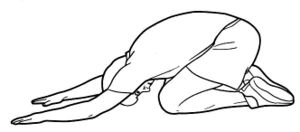Note: This is a project under development. The articles on this wiki are just being initiated and broadly incomplete. You can Help creating new pages.
Difference between revisions of "Balasana"
| Line 1: | Line 1: | ||
| − | [[File:Balasana. | + | [[File:Balasana.jpg|thumb|right|''Balasana'']] |
Bālāsana (Sanskrit: बालासन), Child's Pose, or Child's Resting Pose is an asana. Balasana is a counter asana for various asanas and is usually practiced before and after Sirsasana. | Bālāsana (Sanskrit: बालासन), Child's Pose, or Child's Resting Pose is an asana. Balasana is a counter asana for various asanas and is usually practiced before and after Sirsasana. | ||
Revision as of 17:06, 13 December 2016
Bālāsana (Sanskrit: बालासन), Child's Pose, or Child's Resting Pose is an asana. Balasana is a counter asana for various asanas and is usually practiced before and after Sirsasana.
Etymology
The name comes from the Sanskrit words bala meaning "child" and asana (आसन) meaning "posture" or "seat".
Description
In this asana, the body faces the floor in a fetal position. The knees and hips are bent with the shins on the floor. The chest can rest either on the knees or the knees can be spread to about the width of a yoga mat, allowing the chest to go between the knees. The head is stretched forward towards the ground - the forehead may touch the ground. The arms may be stretched forward in front of the head or backwards towards the feet.
